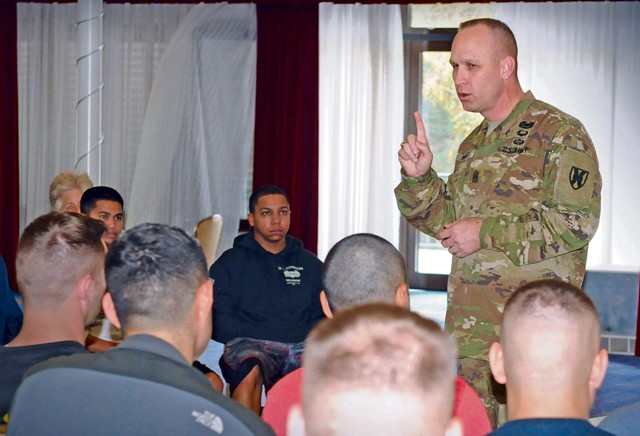
Soldiers from throughout the 21st Theater Sustainment Command gathered Nov. 9 through 13 at Armstrong’s Club on Vogelweh to attend the Soldier 360 Leader’s Course, developing resiliency techniques they will be able to take back to their units.
The Soldier 360 course is designed to teach a number of resiliency techniques and life skills, with classes in subjects such as stress management, physical and mental fitness, effective sleeping, self-assessment and effective personal communication.
The materials covered in the course dig deep into these and other subject areas and can bring out an intense emotional response among veteran Soldiers, many of whom may be struggling with residual stress from combat experiences, according to Command Sgt. Maj. Rodney Rhoades, 21st TSC senior enlisted leader, who addressed the participants about midway through the course.
“It’s not easy to talk about this stuff,” Rhoades said. “But we need to. We need to open up. And we need to be able to ask for help because you can’t always just go it alone.”
In addition to individual resiliency, the course also addressed couples and family communication, and spouses were invited for part of the course to participate in a variety of family communication activities.
The intent behind the course, according to Soldier 360 Executive Director Steve Salazar, is to focus on junior leaders, both making them aware of the issues surrounding resiliency and arming them with techniques to help point their Soldiers in the right direction for help.
“We target NCOs specifically, because we believe that as the backbone of the Army they are bearing the stress of everything we’re asking the Army to do,” Salazar said, who is also a retired brigadier general who last served as the commander of the Joint Multinational Training Command in Grafenwoehr, Germany. “And because they’re noncommissioned officers, and because of the culture of the noncommissioned officer, and the fact that it’s their job to make things happen and fix problems; they generally don’t allow themselves to acknowledge that they have problems.”
Breaking through that mindset and encouraging leaders to get help when they need it is important not only to those leaders, but also their Soldiers as well, according to Salazar.
“It allows them to understand and have empathy with their Soldiers who are going through their own problems,” Salazar said.
For more information about the Soldier 360 program or to find out about upcoming courses in your area, visit www.360-program.com.


